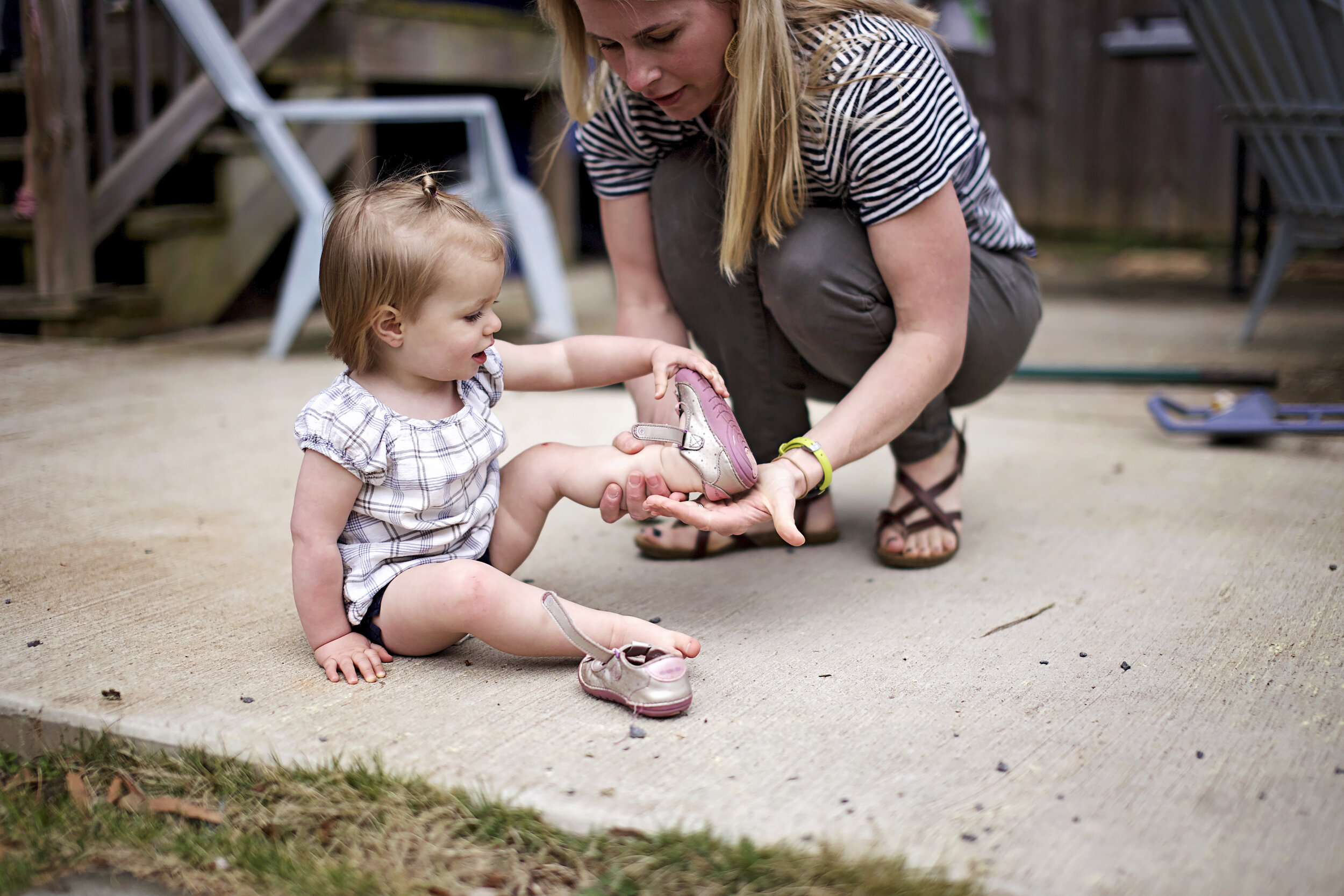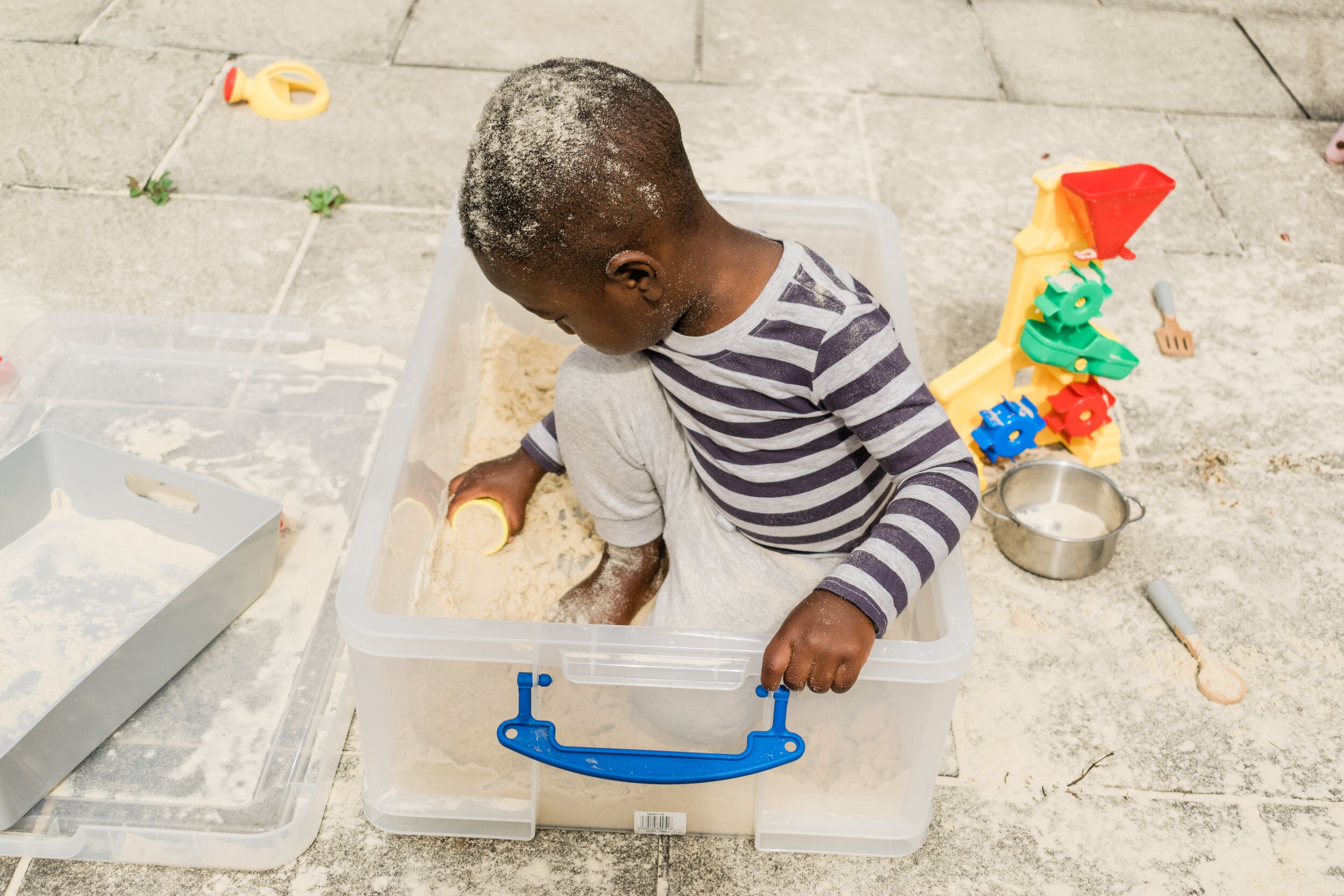50 Ways To Promote Baby and Toddler Independence
In childcare centers where I worked as an Occupational Therapist, it never failed to surprise parents just how independent their babies and toddlers were away from home. While they still spoon-fed their little ones in high chairs, at "school," their kiddos sat in little chairs at little tables, ate off of plates, drank from open cups and used utensils. They slept on cots or mats instead of in cribs, took their own shoes off before naptime, and washed their hands before meals.
Your little one will always be "your baby," but an important step in their development is gaining a sense of independence.
This can start VERY early on by letting your child participate in and help with everyday tasks. Here are some simple tips, tricks and ideas for letting your baby or toddler help in many little ways, every single day.
Why Independence Matters in Early Childhood
From a psychological perspective
Developing independence cultivates self-confidence and self-efficacy - a sense of "I can do it!" It strengthens your connection with your child by showing them that you are trusting of and confident in them.
From a behavioral perspective
Many of the challenging behaviors we see in toddlerhood stem from a drive for agency, or the capacity to act independently and make choices. Toddlerhood isn’t merely a phase of power struggles - this is often our first glimpse as parents into our child requesting to be treated as a full fledged human, deserving of power and control over themself.
If power and control aren’t shared, most toddlers will push for independence and assert their demand for it (in dramatic toddler ways) as a natural part of not just this developmental stage but as a natural part of being a human. By giving your child independence, autonomy and control when possible you reduce their need to communicate unmet needs through problematic behaviors.
From a language development perspective
Everyday life is the ideal opportunity for natural learning to take place. Including your child in personal and household tasks will afford amazing opportunities for your kiddo to develop language skills! And the fact that daily tasks happen...well, daily means that new language gets repeated and solidified.
Ask questions. Use descriptive words. Offer choices. Toddlers have many ways of communicating beyond spoken words - facial expressions, gestures like nodding or pointing, making sounds or word approximations that are understood by familiar listeners (that’s you!).
Asking, "What do we need to brush your teeth?" while standing at the bathroom sink might elicit a physical reach response in the direction of their toothbrush. This response shows awesome receptive language development.
From a sensory motor development perspective
Allowing your little one to help affords rich experiences to develop new motor skills, strength and coordination for every day life. It also provides valuable new sensory processing experiences that will be parts of their every day life as they get older - things like learning how much force is needed to open a container ("pressure and stretch sense" or proprioceptive sense), feeling a wet soggy sponge in their hands as they wipe the table ("touch" or tactile sense), balancing as they bend down to pick up their shoes ("movement" or vestibular sense and proprioceptive senses).
From a practical parenting perspective
Including your kiddo in the day to day runnings of your family promotes relationship and connection. Have to make breakfast and your toddler is underfoot and whining or running off with your phone they pulled off the counter? Pull up a stool and let them help you count and stir the eggs. It won't save you time, but it might just turn a moment of losing patience into a moment of togetherness.
Essential Tools for Early Independence
This page includes affiliate links, which means I earn a small commission when you purchase products through these links. I only link to products I use or love. Thanks for supporting CanDo Kiddo + Family. See my disclosure page for more information.
A Sturdy Step-Stool: A sturdy step stool (with very close supervision) is important for getting your young child to counter-height. My favorite option for babies (who can stand steadily) and toddlers is a very sturdy stool with sides or rails (sometimes called a "learning tower") like the Growing Step Stool. A more affordable option is the IKEA Bekvam Step Stool, which is unique in that it is over 19" tall. Most step stools for kids aren't actually tall enough to bring a baby or young toddler to counter height so be sure to note height when shopping.
Time: Not to be overlooked is the fact that baby and toddler "help" is usually not actually helpful in the short-term. Do I let my 14 month old help wash dishes every time I do it? No way! But once or twice a week, I'll invite him to join or now he'll ask to help and I'll oblige. It takes more time to let your child actively participate in their care and in daily household tasks. In an ideal world, we'd be able to clear our schedules and slow down the pace of life a bit during the season of parenting young children and many parenting experts agree that this would benefit our kids' levels of stress and anxiety. But if that's not an option for you, pick times of the day or week when you can spend an extra few minutes letting your kiddo help.
Patient Presence: If you ask your young toddler to take off their shoes while you turn your back to put down the diaper bag and put your coat up, you may find themplaying in the dog's water bowl with shoes still on when you look back at them. At least, that's what happens daily in our house! In all seriousness, babies and toddlers are developing their independence - they aren't independent yet. When involving them in a task, it is essential that you remain close and attentive (cell phone down) so that you can offer assistance, modeling and encouragement if needed.
Five Ways To Support Baby and Toddler Independence
I'll Start, You Finish
A simple way to let your little one help is for you to start a task or a part of a task and let them them complete the next or final step. This is most often the approach I use when I teach children to feed themselves. Examples: opening the top of a banana and separating part of the peel then letting your baby pull each section down; pulling your child's arms out of sleeves then letting them pull it off of her head; loosening your baby's shoes and slipping them off their heels then letting them pull them off.
"You Start, I'll Finish
This is a great approach for clean-up and self-care tasks that ultimately have to be done thoroughly. Examples: letting your little one try to brush their own teeth then you follow-up; allowing your little one to wipe the table or tray after meals.
Let's Do It Together
This approach is great for very challenging tasks or tasks that require hands-on assistance for safety. Examples: cracking eggs into a bowl at breakfast, cutting soft foods with a child's knife, washing dishes, pouring water on the head to rinse off at bathtime.
I'll Show You Then You Try
Try this method for tasks that are require only basic skills. Examples: putting dirty clothes in a basket or hamper, pulling a hat off, or carrying a very lightweight bag of non-breakable groceries.
You pick
The simple act of letting your baby or toddler make choices is a great way to encourage early independence. Examples: letting your child choose between two shirts, two snacks or two toys by looking, reaching, pointing or using her words.
If you like understanding your toddler’s development and learning specific strategies like this to naturally support it without the crafty Pinterest tot school activities, I’ve got an amazing resource for you - check it out!
50 Ways To Let Your Baby or Toddler Help
Dressing
pull shirt off head
push arms through sleeves
pull socks off (pull off heel and loosen at toe to assist)
pull shoes off (loosen and pull off heel to assist)
pick between two pieces of clothing
put shoes in a basket or box by the door
unzip jacket
zip jacket (after you engage the zipper)
pull hat off
pull pants up (while standing)
pull pants off (while laying or seated; pull below hips to assist)
Grooming and Self-Care
brush teeth
brush hair
wipe face and hands
blow or wipe nose
pour water from cup to rinse off in bath
rub baby-safe soap onto body
wash hands
pull fresh wipes from container
hold clean diaper until you need it
pick which towel to use
dry off after bathtime
Around the House
wipe up spills
open and shut doors and gates
sweep
dust
wash dishes
shuck corn
crack eggs
pour pre-measured ingredients into bowl
mix with spoon in bowl
put items in trash
pull laundry from dryer into a basket
put dirty clothes in basket or hamper
put fresh bags in trash containers
put new baby wipes in container
put toys and books in baskets or bins
carry a lightweight bag of non-breakable groceries
get arms out of stroller and car seat straps once adult unbuckles
water plants
turn lights on or off (pick child up if step stool isn't near to assist)
Mealtimes
choose between two snacks
peel a banana
open a container (tear packaging or loosen lid to assist)
cut soft foods with a toddler knife
feed self (even if it's messy!)
pour drink from small pitcher into cup
wipe tray or table after meal
wipe face and hands after meal
put items in sink, on counter or in a tray/bucket
How Early Can I Start Promoting Indendence?
From day one of life, you can involve your baby in their care by talking them through what you're doing to them and around them. It's tempting to put a mobile above the changing table and hustle through diaper changes and there's nothing wrong with that some of the time.
But by making an effort to slow down and talk to your child - "Now let's wipe your bottom. Is that wipe cold? Let's put your fresh diaper on. You're all clean and dry - doesn't that feel nice?" - you engage them in their care and lay the foundation for physically involving them in it in a few months. Here's a great post about respectful diaper changing from Janet Lansbury.
Your baby can be an active participant in their everyday care once they can reach and grasp. At 4-6 months of age, most babies "find their feet" and it's a perfect time to start letting your little one help pull socks off. Once your baby can grasp, they can try pulling wipes from the container. I strongly recommend parents encourage self-feeding at every meal from the very first introduction of solids. And if and when your baby is walking, a whole new world of helping opens up!
Encouraging independence starts early - earlier than most parents realize is even possible. Allow your kiddo to help, fellow parents, and prepare to be blown away when your itty bitty baby shows you what they CAN DO!
Want more resources for encouraging toddler play?
Using my professional knowledge of toddler development plus my experience as a mom, I created a free video lesson sharing my 3 top tips (plus a bonus!) for increasing independent play in toddlers.




